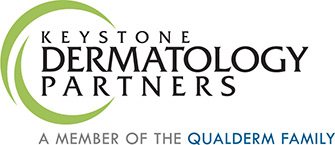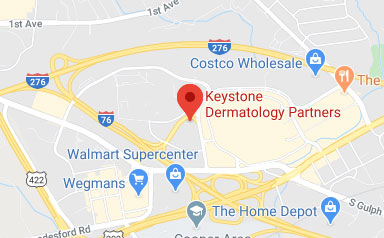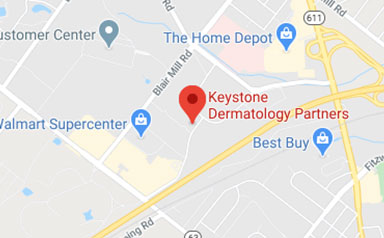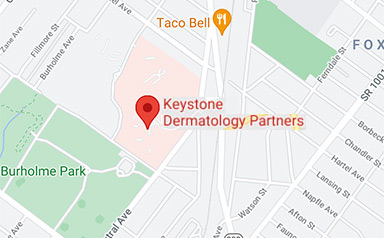Conveniently located to serve Philadelphia and King of Prussia
Actinic keratosis is a skin condition that causes rough bumpy spots to develop on the face, hands, and arms. The spots that appear due to the condition are commonly referred to as actinic keratosis or sunspots. For effective treatment of actinic keratosis in Philadelphia, visit Keystone Dermatology Partners.
Symptoms of Actinic Keratosis
Actinic keratoses form on the parts of the body most exposed to the sun. Actinic keratosis spots appear most frequently on the hands, arms, face, scalp, and neck.
This skin condition appears as thick, scaly, and crusty patches on the skin. The coloration is typically brown, tan, gray, or pink. It may be accompanied by a burning or itchy feeling.
In a small percentage of cases, actinic keratosis can progress to squamous cell carcinoma, which is a form of skin cancer. If you notice hardening of the lesion, inflammation, bleeding, or ulceration, contact our office immediately.
Causes of Actinic Keratosis
Actinic keratosis is a natural consequence of aging and excessive sun exposure over time. Aging is the most common cause of actinic keratosis. Other causes of actinic keratosis include the HPV virus and a weakened immune system.
Certain risk factors can also make you susceptible to the condition. People with fair skin, red or blond hair, and blue eyes are examples of people with higher chances of developing sunspots.
How Can Actinic Keratosis Be Treated?
Actinic keratosis may be treated in the following ways:
Excision – The lesion may be removed from the skin using a scalpel.
Cauterization – In cauterization, the lesion is burned with an electric current.
Cryotherapy – In cryotherapy, the lesion is treated with liquid nitrogen or another cryosurgery solution that freezes the cells. After treatment, the area will simply scab and fall off.
Topical Medical Therapy – Actinic keratosis may be treated with topical treatments like 5-fluorouracil or imiquimod and ingenol mebutate.
Phototherapy – In phototherapy, a solution is applied over the area and exposed to laser light, which kills the cells. The prescription medications used in phototherapy include aminolevulinic acid and methyl aminolevulinate cream. If phototherapy is chosen, it will be referred out.
How Can Actinic Keratosis Be Prevented?
You can prevent actinic keratosis by following these general sun exposure guidelines:
- Avoid the sun during midday.
- Use a sunscreen of at least SPF 30. Make sure the sunscreen targets both UVA and UVB rays.
- Wear hats and sunglasses, and cover your body when exposed to direct sunlight.
- Avoid artificial tanning using tanning beds.
What Is Actinic Keratosis Treatment Recovery Like?
Post-treatment recovery time will vary based on the number of actinic keratoses and their size. The exact treatment modality used will also play a role.
Actinic keratosis is extremely treatable, and most spots disappear over time. To avoid the recurrence of actinic keratosis, it is best to avoid further sun damage and exposure to UV rays.
Only 10% of actinic keratosis spots develop into skin cancer. However, it is advisable to check for any abnormal growths around the face, neck, ears, arms, and hands as a preventive technique.
Schedule an Informative Consultation
To learn more about treatment of actinic keratosis, Philadelphia patients can contact Keystone Dermatology Partners for a consultation. We will recommend the best treatment option to ensure that your actinic keratoses are properly addressed.





